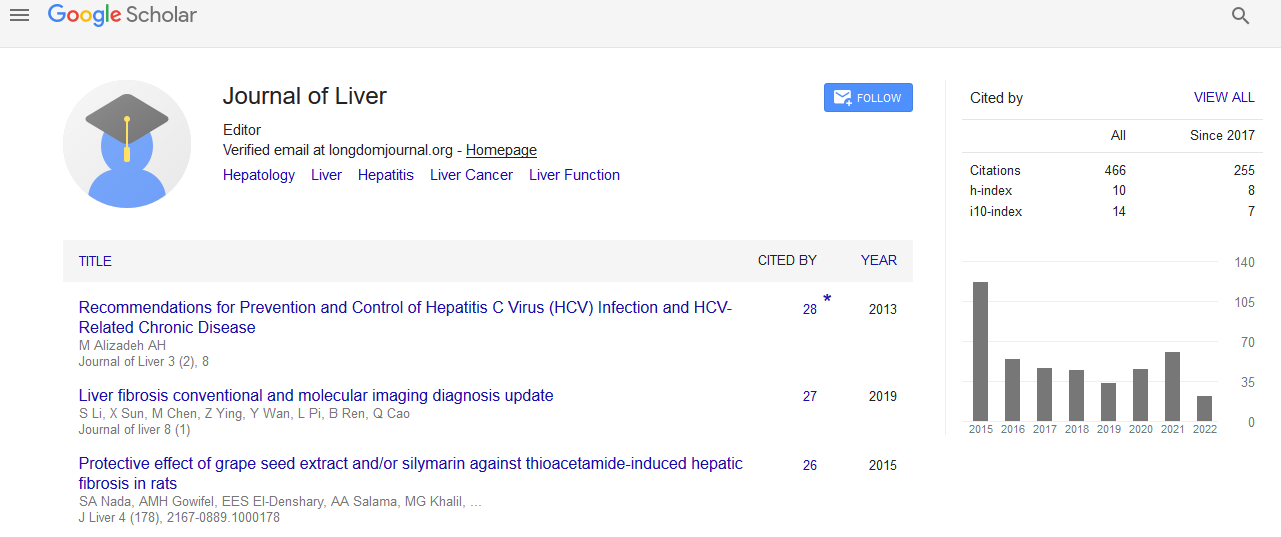PMC/PubMed Indexed Articles
Indexed In
- Open J Gate
- Genamics JournalSeek
- Academic Keys
- RefSeek
- Hamdard University
- EBSCO A-Z
- OCLC- WorldCat
- Publons
- Geneva Foundation for Medical Education and Research
- Google Scholar
Useful Links
Share This Page
Journal Flyer

Open Access Journals
- Agri and Aquaculture
- Biochemistry
- Bioinformatics & Systems Biology
- Business & Management
- Chemistry
- Clinical Sciences
- Engineering
- Food & Nutrition
- General Science
- Genetics & Molecular Biology
- Immunology & Microbiology
- Medical Sciences
- Neuroscience & Psychology
- Nursing & Health Care
- Pharmaceutical Sciences
Depressive episode incidence in patients with chronic hepatitis C treated with pegylated interferon and ribavirin
CO-ORGANIZED EVENT: 5th World Congress on Hepatitis & Liver Diseases & 2nd International Conference on Pancreatic Cancer & Liver Diseases
August 10-12, 2017 London, UK
Izabella Liguori Corsino Vabo
Federal University of Juiz de Fora, Brazil
Hospital and Maternity Therezinha de Jesus, Brazil
Posters & Accepted Abstracts: J Liver
Abstract:
Statement of the Problem: The effectiveness of antiviral therapy with pegylated interferon and ribavirin for chronic hepatitis C is far from ideal and presents several adverse events. Among such events, there is the depressive episode that can even lead to treatment discontinuity. Objective: The objective of the study was to analyze the incidence of depressive episodes in patients with chronic hepatitis C treated with pegylated interferon and ribavirin, as well as the possible factors associated with its occurrence and its impact on patients sustained virological response. Materials & Methods: People with chronic hepatitis C undergoing antiviral therapy were interviewed at the baseline, at the 4th, 12th, 24th and 48th treatment weeks and 4 weeks after the end of it, using the HADS (Hospital Anxiety and Depression Scale) scale for tracking the depressive episode. Patients with HADS�?�9 were subjected to Beck Depression Inventory (BDI-II) to grade the episode. Clinical, socio, demographic, laboratorial and histological variables were obtained to identify factors related to the onset of depression. The sustained virological response rate (negative HCV-RNA 6 months after end of therapy) was compared among patients with and without depressive symptoms. Results: The study comprised 32 patients. The depressive episode was diagnosed in 25% of the patients and the peak incidence was found in the 12th treatment week. The depressive episode was moderate in 87% of the patients. None of the analyzed factors was associated with depressive episode onset. A trend was observed in female patients. The sustained virological response rate was of 75% and 67% in patients with and without depressive episode, respectively. Conclusion & Significance: The study shows that the incidence of depressive episodes in Brazilian patients with chronic hepatitis C treated with PEG IFN alpha and ribavirin, is high. It is recommended that patients undergoing antiviral therapy with pegylated interferon should be systematically evaluated in search for depressive episode, especially in the first 12 weeks of therapy, since the depressive episode affects a significant number of treated patients.
Biography :
Izabella Liguori Corsino Vabo is a Clinical and Hospital Psychologist and Cognitive-Behavioural Therapist from Brazil. She pursued Master’s degree in Health at Federal University of Juiz de Fora, Brazil with emphasis on research in chronic hepatitis C. She is the Coordinator in the Department of Hospital Psychology, Hospital and Maternity Therezinha de Jesus, Juiz de Fora, MG, Brazil. She has been working for more than 10 years in this area.

